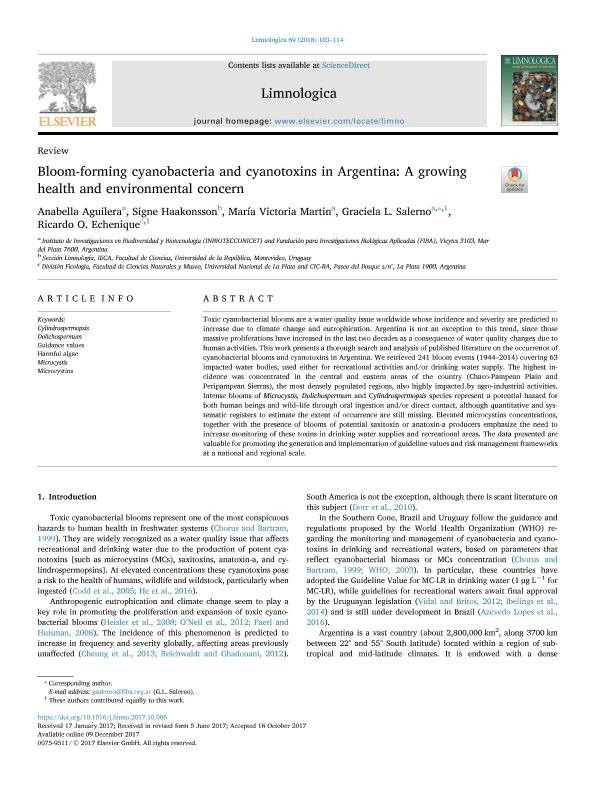Artículo
Bloom-forming cyanobacteria and cyanotoxins in Argentina: A growing health and environmental concern
Aguilera, Anabella ; Haakonsson, Signe; Martin, María Victoria
; Haakonsson, Signe; Martin, María Victoria ; Salerno, Graciela Lidia
; Salerno, Graciela Lidia ; Echenique, Ricardo Omar
; Echenique, Ricardo Omar
 ; Haakonsson, Signe; Martin, María Victoria
; Haakonsson, Signe; Martin, María Victoria ; Salerno, Graciela Lidia
; Salerno, Graciela Lidia ; Echenique, Ricardo Omar
; Echenique, Ricardo Omar
Fecha de publicación:
01/2018
Editorial:
Elsevier Gmbh
Revista:
Limnologica
ISSN:
0075-9511
Idioma:
Inglés
Tipo de recurso:
Artículo publicado
Clasificación temática:
Resumen
Toxic cyanobacterial blooms are a water quality issue worldwide whose incidence and severity are predicted to increase due to climate change and eutrophication. Argentina is not an exception to this trend, since those massive proliferations have increased in the last two decades as a consequence of water quality changes due to human activities. This work presents a thorough search and analysis of published literature on the occurrence of cyanobacterial blooms and cyanotoxins in Argentina. We retrieved 241 bloom events (1944?2014) covering 63 impacted water bodies, used either for recreational activities and/or drinking water supply. The highest incidence was concentrated in the central and eastern areas of the country (Chaco-Pampean Plain and Peripampean Sierras), the most densely populated regions, also highly impacted by agro-industrial activities. Intense blooms of Microcystis, Dolichospermum and Cylindrospermopsis species represent a potential hazard for both human beings and wild?life through oral ingestion and/or direct contact, although quantitative and systematic registers to estimate the extent of occurrence are still missing. Elevated microcystins concentrations, together with the presence of blooms of potential saxitoxin or anatoxin-a producers emphasize the need to increase monitoring of these toxins in drinking water supplies and recreational areas. The data presented are valuable for promoting the generation and implementation of guideline values and risk management frameworks at a national and regional scale.
Archivos asociados
Licencia
Identificadores
Colecciones
Articulos(CCT - MAR DEL PLATA)
Articulos de CTRO.CIENTIFICO TECNOL.CONICET - MAR DEL PLATA
Articulos de CTRO.CIENTIFICO TECNOL.CONICET - MAR DEL PLATA
Articulos(INBIOTEC)
Articulos de INSTITUTO DE INV. EN BIODIVERSIDAD Y BIOTECNOLOGIA
Articulos de INSTITUTO DE INV. EN BIODIVERSIDAD Y BIOTECNOLOGIA
Citación
Aguilera, Anabella; Haakonsson, Signe; Martin, María Victoria; Salerno, Graciela Lidia; Echenique, Ricardo Omar; Bloom-forming cyanobacteria and cyanotoxins in Argentina: A growing health and environmental concern; Elsevier Gmbh; Limnologica; 69; 1-2018; 103-114
Compartir
Altmétricas



